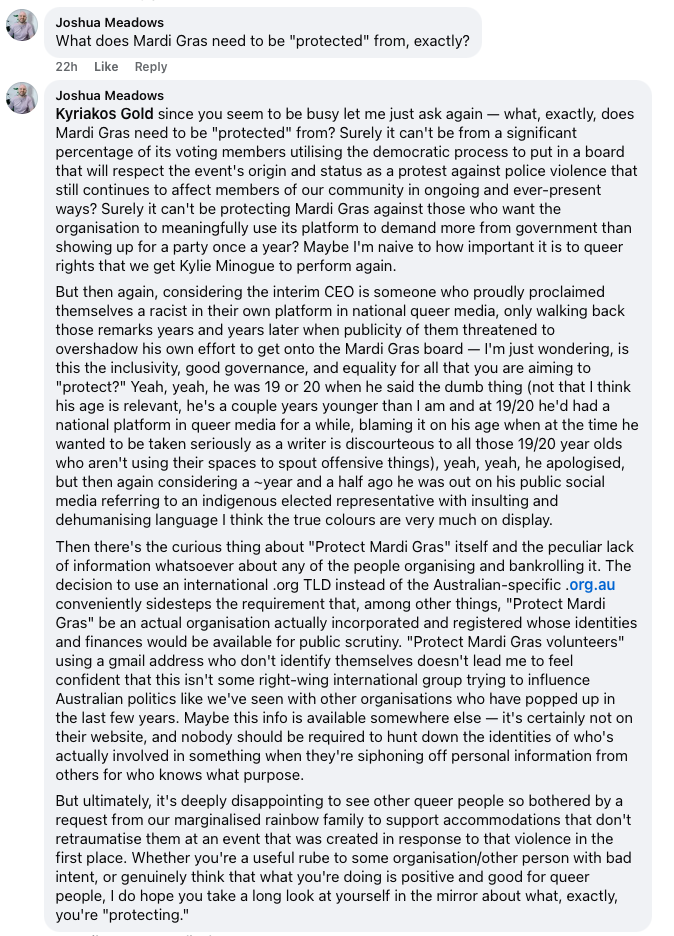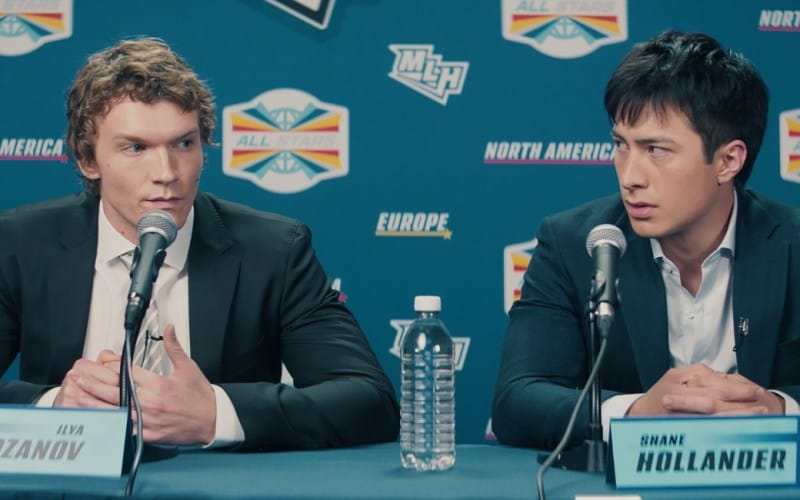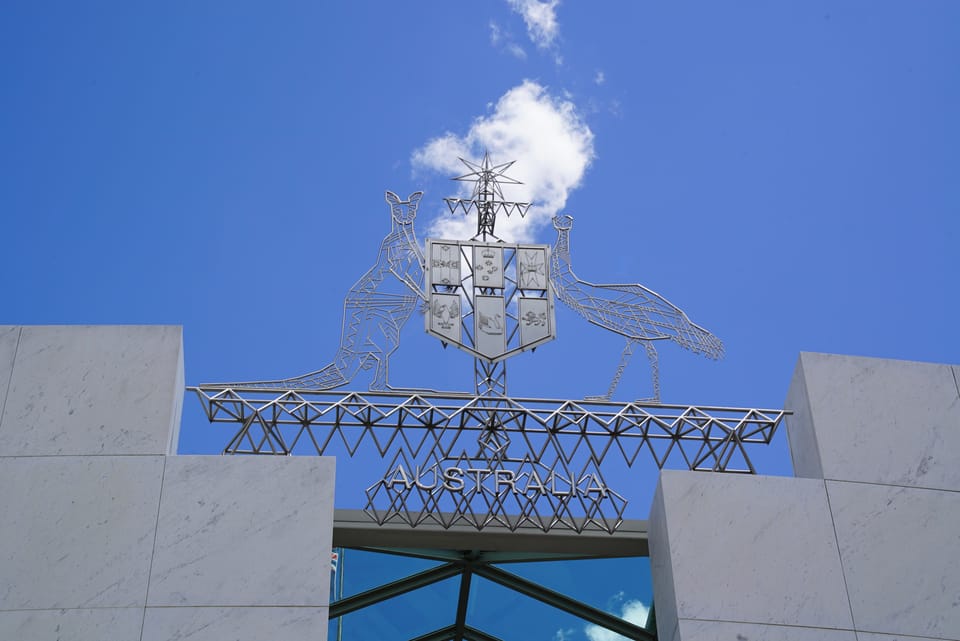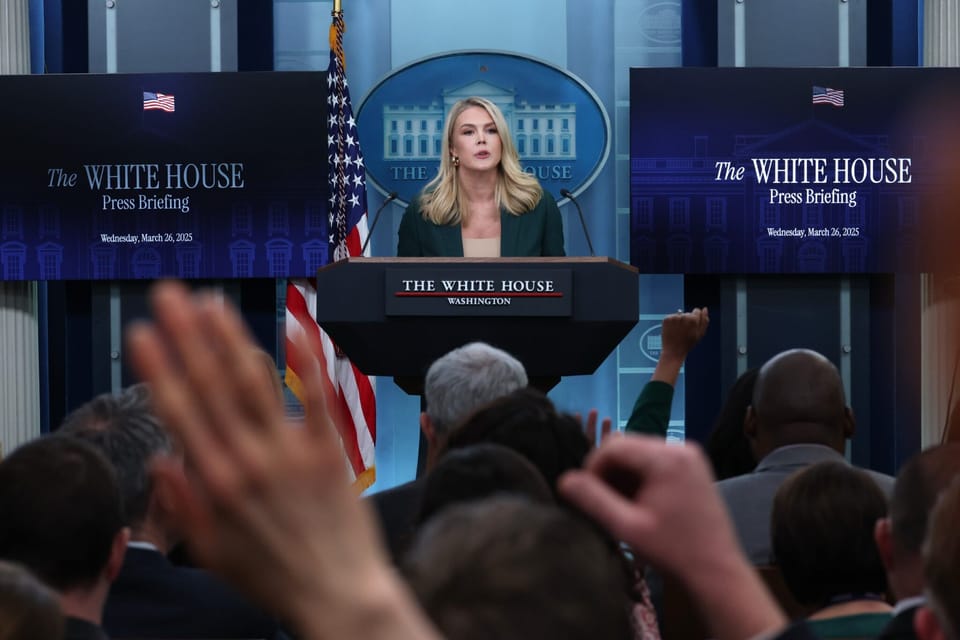"Protect Mardi Gras" or else Kylie might not perform again!
Assimilationist queers are not a new thing, and every oppressed minority has its own flavour of folks who think appeasement and ass-kissing is the best way to save their own necks.


This current Sydney Mardi Gras board member, who is re-running for his position with the backing of the "Protect Mardi Gras" initiative (I'll get back to them) doesn't seem able to respond to my question to him on Facebook. Weird, can't imagine why.
Of course, the question itself is rhetorical, because for all the Orwellian gaslighting by "Protect Mardi Gras" and gross misapplication of language, it's very obvious what the organisation actually wants to "protect" against. Since my original message has gone unanswered, I'll expand on my perspective about all of this and why I think it's important.
A primer for those outside of Australia: Mardi Gras is an event that takes place in Sydney every year and is one of the largest queer festivals in the world. Grown out of initial marches in Sydney arguing for queer rights through the 70s, the first "Mardi Gras" happened as a protest parade in 1978 in commemoration of and solidarity with the Stonewall Riots. At its inception it was a protest about the treatment of queer people, particularly by the police — the parade's permit was suddenly revoked and the parade itself forcibly broken up with over fifty people arrested — and a call for greater visibility and acceptance of queer people throughout Australia.
As in other parts of the world, as that visibility and acceptance has grown, those with the least discrimination against them are the first to step off the ladder and try to pull it up behind themselves. Assimilationist queers are not a new thing, and every oppressed minority has its own flavour of folks who think appeasement and ass-kissing is the best way to save their own necks.
Given the parade's origin out of police brutality against queer people, there's long been friction between those who don't feel they should have a presence in the parade and those who disagree.
There's been lots of compromises offered that stop short of a full ban: for example, police and military can march in other floats like every other community organisation does; why should they be given a special bespoke position in a parade that these days is already so long that actual legitimate queer organisations have their applications turned down due to lack of space? Even giving them that space but asking them not to march in uniform is seen as an unreasonable bridge too far at our event created because of their actions, harassment, and discrimination.
It's also often said that queer police and military should be able to march alongside allies, to which my response is: quit your job? A uniform you can take off is not the same as an innate, intrinsic part of your identity that you will lose your rights — or worse — over.
Anyway, this friction has come increasingly to a head over the years, particularly in light of what is seen by an increasing portion of the voting membership as institutional failures by Mardi Gras itself to hold politicians accountable for doing more to protect us. Many people don't feel that the organisation holds wide swaths of the queer community in equal regard, and it's not hard to see why.
This is where I, with great reticence, must speak about Jesse Matheson: a former board member and now interim CEO of Mardi Gras who is also an odious, detestable person that I would rather never have a synapse fire about in a perfect timeline, but this is the timeline that we live in.
I won't get into the Jesse Matheson I knew privately as a person, but I don't really have to because his public record speaks for itself: when he was a writer for Star Observer, Australia's largest and longest-running queer publication, I once saw Matheson referred to as a "gay Miranda Divine" and I can think of no comparison more appropriate. He's most infamous for an incredibly offensive piece defending the sacred right of queers to discriminate against other queers on dating apps, but genuinely — this is really the tip of the iceberg of awful, nasty things he wrote during his tenure with Star Observer as far as I'm concerned. Unfortunately, much of his archive there was pulled at his request a few years later so you can't truly experience the spectrum of shitty opinions Matheson had about everything (don't worry, I have a lot of contempt with Star Observer agreeing to do this, as well — what examples can you think of a "journalist" asking a former outlet to eliminate their contributions to that outlet, and that outlet agrees?). When Matheson was running for the Mardi Gras board initially and his terrible writing (both in content and in style) started generating controversy that might overshadow his attempt to get a board seat, this was when he, suddenly — though the articles had been online for years with no retraction or apology before then — had a public change of heart and penned an apology explaining that in the — checks notes — ~three years between the original article and wanting to run for a board seat, he'd grown older and wiser and learned "the power of words." Convenient.
(The years-later apology was taken down in the later purge as well, incidentally — not simply the original, offending article. I'll leave it to the reader to interpret how remorseful that action comes across.)
I find that people contemporarily try to justify his writing back then by pointing to his age. And, yes, those of us like myself who knew Matheson at the time could certainly tell you that he was young and stupid and confidently writing opinions about things he was ill-equipped to speak on — like many people who are given a platform beyond their world experience. But those of us who knew him also know that he demanded to be taken seriously as a Serious Journalist™, and dismissing him using that platform in a national publication "because he was nineteen" does a disservice to every nineteen year old who isn't writing divisive, discriminatory, and damaging things to generate attention.
He's also only a few years younger than I am, and as a contributing writer to one of the US' largest print magazines for young queer people, I certainly wrote things that I look back on now and cringe at — because I was a sixteen year old giving life advice to strangers that, though it came from a place of sincerity, I had no lived experience to speak to.
But, I am happy to say that across my entire career as a writer I don't think I'm likely to find myself in a position, years later, of having to retract and apologise for offending people with something that is now taken as bigoted — and certainly not because I was intentionally trying to be ~ * ~ controversial ~ * ~, either.
He also is fine pointing out that when he was elected to the Mardi Gras board at twenty-four he was one of the youngest members ever on it — why does his age exempt him from criticism for using his platform at the time to share opinions which hurt and disenfranchised even more marginalised members of our community when he wants to use his age as an accomplishment in and of itself later on?
In any event, the argument that "he was young" is blown out of the water when two years ago or so he referred to an indigenous elected representative with offensive language in response to her actions in protest against police at the parade itself. Lidia Thorpe has been a more consistent ally and champion for queer people and queer rights beyond anything he's done for anyone who doesn't look like he does, and calling her an "idiot" is truly contemptible.
It was disheartening enough that he got elected to the board in the first place, but especially moreso that he was installed as interim CEO without external deliberation and allegedly following a board-only meeting that he, himself, was present at.
The internal reaction to his appointment was a mass exodus of staff directly citing his promotion as their reason for quitting, and a letter signed by thirteen of the organisation's then-fifteen employees directly calling the board out for it:
Signed by 13 of the non-profit’s then-15 employees and delivered on a Friday about 40 days ago, the letter was blunt: the board’s appointment of Jesse Matheson as interim CEO, announced to staff earlier that week but not made public until five weeks later, was said to pose a serious reputational and financial risk – and could potentially jeopardise the organisation’s ability to pass an upcoming audit.
Their departures came as Mardi Gras was still grappling with the fallout from a scathing governance review by auditors KPMG, mandated by Destination NSW as part of its agreement to provide the non-profit with the $1.1 million in emergency funding.
The final report, given to Mardi Gras in October last year but leaked to Gay Sydney News in December, identified issues with a financial report Beckwith had presented to the directors and raised concerns about Bear simultaneously serving as board co-chair, company secretary, and chair of the audit and risk committee – roles it said “should ideally be independent of the Board Chair position”.
Classified as an “extreme” risk was the independence of the unpaid board. It said many members had longstanding ties to Mardi Gras through volunteer roles or governance history, which the review said could “potentially impair their ability to act completely independently”.
Despite the review’s warnings about blurred governance lines, the board responded to Beckwith’s resignation by appointing company secretary Matheson as interim CEO.
That decision – which staff argued in their letter was made without a transparent selection process and, according to a source close to the organisation, was made immediately after a closed-door, board-only strategy session on governance and operations that Matheson himself took part in – would go on to unravel confidence within the organisation.
“That certainly raised eyebrows,” the source said of Matheson’s participation in the session, adding that co-chairs had told staff he was chosen directly after the all-day meeting.
Promoting the company secretary – who had already been attending board meetings – to interim CEO blurred essential lines between oversight and operations, staff wrote.
Speaking only for myself, if I'd been promoted to a position and the response by a significant amount of current staff was to quit and write a letter to the board about my appointment, I'd assess whether or not it was best for the organisation I'd been promoted in to still be there. At bare minimum I'd listen to the overwhelming voices in opposition, internally and externally, instead of thinking I knew better.
But, then again, my ego fits within the same room I'm in, so perhaps I'm operating on a different wavelength here.
When I ran Sydney Gaymers and GX Australia, I regularly had conversations with young queer kids of colour who specifically told me about their experiences on dating apps like Grindr — a comment by one particularly sticks in my mind whenever I think about this topic: "when I came out and started looking at going on dates and saw wall after wall of profiles saying 'no asians,' it hurt more than any bullying I'd ever experienced beforehand."
I do genuinely hope that Matheson has taken the time to reflect on the pain and harm his actions caused, and how when he had the opportunity to use his platform for good he tried "to create conflict" instead; given his propensity to blame it on his age and immaturity, though, I think he's more concerned about losing career opportunities and progression now than any genuine contrition over his behaviour back then — behaviour that I have little reason to think has changed, only that he's been shrewder about how publicly he shares it.
In any event, and with the fervent hope that I never have to think about this truly awful person ever again, this is the backdrop against which "Protect Mardi Gras" enters the chat and the "inclusivity" they seem to want to maintain.
Though it purports itself to be a grassroots organisation, their official website has no information about who they are, who the initiative is organised and paid for by, and who is directing things. One can certainly intuit, given that there's only a handful of actual names directly quoted on the site, and in other sources and interviews externally there are people identified as "founders," but it's quite an odd absence to be missing from the official website and other official resources. The decision to register as an international .org domain instead of an Australian-specific .org.au also conveniently sidesteps the registrar requirements in this country that the organisation be an actually-incorporated non-profit identity whose finances (and directors) would be available for public scrutiny. This omission is particularly weird given some of the people they're directly endorsing for the Mardi Gras board in the upcoming AGM vote.
"Protect Mardi Gras," with its flashy and splashy marketing (but using a gmail address), came in opposition to other actually-grassroots initiatives that have been increasingly successful in trying to hold the Mardi Gras board accountable to the queer community and force it to respect its political and activistic origins. Their particular ire is towards the Pride in Protest faction whose motions have increasingly grown in support year on year and whose criticism of Mardi Gras overall is that it's an overly-corporatised event which falls far short of what it needs to do for queer Australians.
I think it's obvious by now that I agree more with Pride in Protest's aims than "Protect Mardi Gras," and think the latter absolutely falls into assimilationist and appeasement territory. I don't think police have a reason to be marching in a parade that was inspired by their treatment of us — especially when that treatment continues to this day. I'd stop short of a full ban completely, but there's certainly no reason for them to have a bespoke slot in the parade lineup when other organisations actually operating within our interests can't get in.
And if Albanese wants to march again so badly, he and Labor can actually adopt some progressive, leftist politics for once.
Even more pointedly, given the fact that the last time there was a vote on banning police participation at Mardi Gras it nearly passed with 50% of the votes, it's obvious that enough people don't want them there and don't feel comfortable with them there that any leader with any sense of morality and decency wouldn't wait to be banned — they'd opt not to participate out of respect for the clear voices who don't feel safe with them around, and commit to earning that safety back instead of forcing their way in like bullies.
Asking our community to demand accountability and action from government leaders, alongside promising protection and safety for those within our community who are not white or cis-passing and are treated disproportionately worse because of it, is not "divisive" and "non-inclusive." Using double-speak to muddy intention is childish at best, and if you're the sort of queer who thinks that not rocking the boat will get us rights and respect, I will politely ask you to do the same sort of self-reflection that I think Mardi Gras' interim CEO — someone who was happy to use his platform to ridicule, diminish, and demean for clicks when it suited him, who now wants to be excused for his age and immaturity now that it no longer does — needs to engage in.
(I will also impolitely tell you to grow up, too. Considering the very tone-deaf response by "Protect Mardi Gras" co-founder Peter Stahel in response to one of the board candidates his organisation is backing sending unsolicited campaign material that outed a voting member to their homophobic parents, I don't have high hopes there, though.)
You've got until November 15th to register as a voting member for the upcoming AGM if you're interested in having a say on the direction where one of Australia's most important events for queer visibility ends up heading. One faction doesn't want to be too inconvenient lest banks back out of sponsoring (oops) or the party gets ruined with "politics," the other wants accountability from law enforcement, corporations, politicians — and one another — so they actually do more for our community and our status as equal human beings. I know where my vote will go.





Comments: